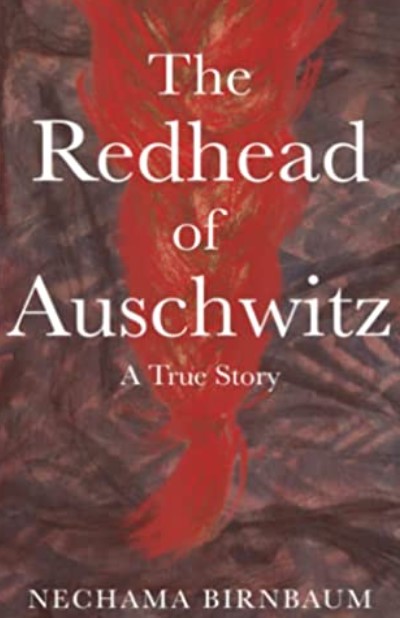
The Redhead of Auschwitz by Nechama Birnbaum
Once upon a time, in the small town of Crasna in 1944, a little girl with red hair who loved to dance heard drums. “It is those Hungarians again. They are always trying to assert their control over our small town…on the border between Hungary and Romania…the two countries fight for us like toddlers fighting for a toy.”
That little girl with red hair and her family were summoned to the town square; the story of Rosie Greenstein begins in that small village square amongst the other Jews, all congregated with suitcases in hand, valuables left behind (“All your valuables must be out for us to see. If they are not, you do not want to know the consequences”), buggies waiting to transport them to the camps of death.
Rosie and her sister Leah, her mama and Yecheskel her brother, her Zaidy, aunts, uncles and cousins formed a tight-knit family who enjoyed warm candle-lit Shabbosim, nourishing food, music, and dance; Leah was the expert seamstress, Rosie the expert with the iron, Zaidy, the nightly visitor who filled in for a father who died young, was the expert who “could lift anything with his big, strong arms.” That family was transported in those buggies to fields of mud and bricks; the red-headed little girl and her sister carried those bricks through the mud from one side of the field to the other, and back, and back again. Buggies eventually gave way to cattle cars which traveled to Auschwitz and Bergen-Belsen and the ensuing horrors of the crowded barracks, the constant line-ups announced by the shrill cry of “Schnell! Schnell!”, the death marches. Cleanliness was impossible, and the promise of a hot shower lured the unsuspecting girls into the gas chamber, saved from death that day by a red-faced SS man yelling at the SS woman: “You almost cost us 750 free, hard laborers; this is a disaster! Get them out, now!”
Nechama Birnbaum is Rosie Greenstein’s granddaughter. Rosie and her sister Leah survived the camps, traveled back to a very hostile Crasna to find her family no longer existed; both eventually married and made new homes, Leah in Israel, Rosie in Brooklyn by way of Minnesota. “The redhead who promised herself that she was going home has 5 children, 28 grandchildren, and 120 great-grandchildren. Each of these children is a world in themselves…If you are reading this now, you are alive, and for you, too, the world was created for you alone.”
It is never easy, for me at least, to read accounts of the Holocaust and the horrors of the camps. Nechama Birnbaum cleverly structured this book in alternating chapters- a chapter recounting the delight of the bouncy nine-year-old, the next chapter recounting the experiences of that little girl and her sister in the mud and agony of the camps. I was walking on the beach this sunny morning and witnessed little children making sand castles out of drippy, salt-water drenched mud; a close friend returned from a trip to Israel a few months ago and brought me a gift of therapeutic mud from the Dead Sea. I am truly amazed that I emerged from reading this book with a new respect for something as mundane as mud- it can symbolize evil and filth; it can morph into castles built amid the sun-sparkling ocean. We can all choose how we view and use Hashem’s world. “My grandmother wants you to know what she went through so you can change the way our future looks. She wants you to know you can never let this happen again…So remember. Remember a redhead who was just skin and bones who said she was going to live. Remember, and make it a world worth living in.” Nechama Birnbaum is one of those 28 grandchildren who reminds us to remember. I feel privileged in my very small way to share her grandmother’s story through these 600-plus words. May we all merit beautiful sand castles, sparkling waters, and families who resolve to honor Hashem’s world.
Randy Rubinstein lives in Sharon, Massachusetts
